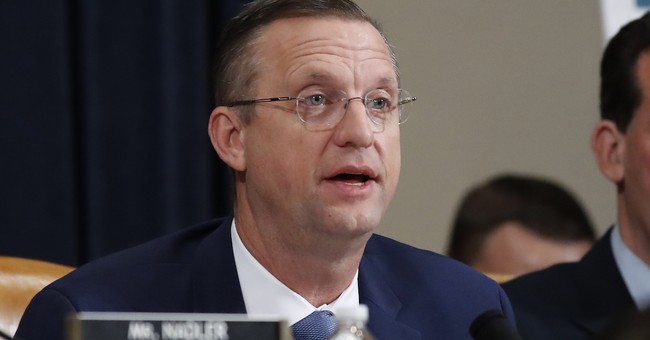
Doug Collins Sponsored Radical Criminal Justice Reform Bill Alongside Rep. Hakeem Jeffries
by Reagan McCarthyRep. Doug Collins (R-GA) has been at the center of the news this week, after his controversial decision to run for the United States Senate in Georgia, against sitting Republican Sen. Kelly Loeffler (R-GA). The Republican establishment has condemned Collins’ move, which many view as selfish. President Trump even expressed his support for Sen. Loeffler’s hard work in the Senate.
Collins’ problems stretch further than having the National Republican Senatorial Committee (NRSC) and a growing number of GOP senators working against him. Rep. Collins has worked closely with Rep. Hakeem Jeffries (D-NY) on radical criminal justice reform legislation. The Prison Reform and Redemption Act reaches further than President Trump’s First Step Act, with some arguing it endangers communities with dangerous provisions.
Criminal Justice Reform is gaining popularity with Republicans, which is long overdue; but critics consistently note that CJR legislation often prioritizes goals like reducing the number of people incarcerated over actually decreasing violent crime.
Collins’ legislation is loosely based on legislation enacted in Collins’ home state of Georgia, and would have allowed violent criminals to roam free.
Collins’ bill creates “time credits” to release certain inmates early:
(2) TIME CREDITS.—
(A) IN GENERAL.—A prisoner shall earn 10 days of time credits for each 30 days that the prisoner successfully participates in a recidivism reduction program or productive activity, except that—
(i) a prisoner (other than a prisoner described in clause (ii)) who has been determined, over two consecutive reassessments, to have reduced their risk of recidivism, shall earn an additional 5 days of time credits for each 30 days that the prisoner successfully participates in a recidivism reduction program or productive activity; and
(ii) a prisoner who has a low or no risk of recidivism and who has been determined, over two consecutive reassessments, not to have increased their risk of recidivism, shall earn an additional 5 days of time credits for each 30 days that the prisoner successfully participates in a recidivism reduction program or productive activity.
The bill excludes “ineligible prisoners,” but still would allow violent criminals to roam free if enacted. “Eligible prisoners” under HR3356 is overwhelmingly measured by objective “risk reduction” and “good behavior.”
Under this bill supported by Collins and Jeffries, the following felons could potentially be released early:
A. Child pornographers, as long as it's their first offense (here's the language in the bill on who is blocked from early release: (xxvii) A second or subsequent conviction under any of paragraphs (1) through (6) of section 2252A(a) of title 18, United States Code, relating to certain activities relating to material constituting or containing child pornography. )
B. 18. U.S. C. 2250 - failure to register as a sex offender
C. 8. U.S.C. 1328 importing illegal immigrants for prostitution
D. 18. U.S. C. 116 - Female genital mutilation
Conservatives and GOP Senators together addressed radical aspects of this legislation pushed by Rep. Collins and Rep. Jeffries, as noted by The Senate Judiciary Committee. The Senate’s version of the bill, which eventually became The First Step Act, ensured that violent criminals would not be let out early. The monumental legislation prioritized the safety of communities, while also combating unfair sentencing.
Rep. Collins' support of this HR3356 is alarming, and speaks to his dangerous legislative priorities. Criminal Justice Reform is a positive legislative feat for Republicans, when done in conjunction with prioritizing the safety of American families and communities.
Collins and Jeffries have a well-known working relationship, and even received Allegheny College's yearly Prize for Civility in Public Life. Working with colleagues across the aisle is admirable, of course, but sponsoring this bill is not simply a bipartisan compromise; HR3356 violates fundamental conservative values and puts Americans at risk. Rep. Collins working with Rep. Jeffries to further the radical prison-reform agenda embraced by progressives is diametrically opposed to the party loyalty Rep. Collins claims to exemplify.